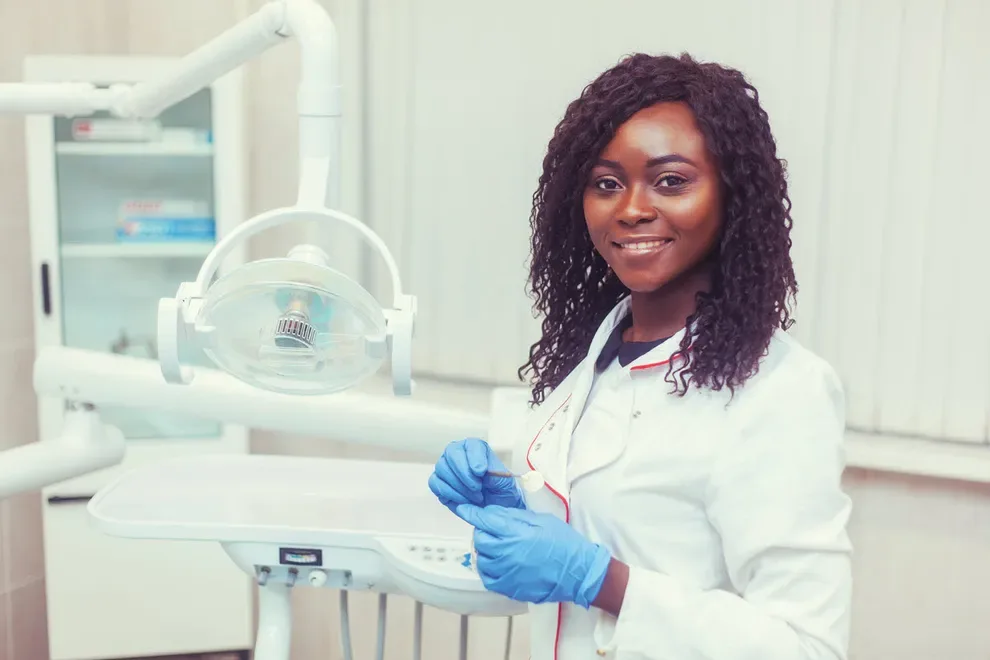How to Maintain Oral Health During Chemotherapy

Table of Contents
- Oral Care Before Treatment
- Chemotherapy Teeth & Gum Damage
- Are Oral Health Complications Permanent?
- Oral Health Issues To Watch For
- Oral Care During Chemotherapy
- Frequently Asked Questions
- Resources
Undergoing chemotherapy treatment can be a challenging and stressful event in someone’s life. After receiving the often-shocking diagnosis of cancer, one must adjust to a new reality that includes regular treatments that will cause changes in the body and in day-to-day life.
During this traumatic time, dental care may seem like a small concern. But chemotherapy can have a significant impact on oral health.
Taking steps to ensure your mouth and teeth are cared for properly throughout your treatment can prevent many common dental health problems faced by chemotherapy patients or at least address them as early and effectively as possible. This can help to avoid unnecessary additional health concerns that could be emotionally and physically taxing. It can also help patients avoid the need to stop chemotherapy treatment due to oral complications.
Oral health issues should be a concern for all chemotherapy patients, but especially so for those with head and neck cancers. Individuals receiving treatment in these areas will likely need their oral care planned and overseen by specialists in this area.
Oral Care for Chemotherapy Patients Before Treatment
Patients should receive a full dental exam before beginning chemotherapy and address any diagnosed or potential issues prior to starting treatment.
Any pain or dental problems will likely worsen during chemotherapy (when the body’s immunity and white cell blood count is lower) and could cause treatment delays or complications.
How Can Chemotherapy Damage Teeth & Gums?
Chemotherapy causes many changes to the oral environment, including these:
Part of chemotherapy’s job is to slow or stop the growth of cells in order to stop cancer cells from further developing. Anticancer treatment also slows and stops cell growth in the mouth. This means the oral tissue in the mouth may not be able to repair itself or will repair itself very slowly.
Radiation therapy is essential in fighting cancer, but it can cause damage to tissue, glands, and bones in the mouth.
The mouth houses its own ecosystem of bacteria. “Bad” bacteria, like plaque, is acid-forming and eats away at tooth enamel. It also causes irritation and inflammation in the gums and can lead to gum disease (periodontitis).
“Good” bacteria work to reduce bad bacteria and inflammation. These bacteria also help to digest food.
Chemotherapy and radiation change the lining of the mouth and affect the salivary glands. This can upset the natural balance of bacteria in the mouth and result in harmful bacteria, causing a number of oral health problems.
Are Changes to the Mouth & Teeth During Chemotherapy Permanent?
Some oral health complications during chemotherapy are acute. They’ll go away or heal after treatment.
Some are chronic and will continue for months or years after treatment. These may include the following:
Dry mouth
Tooth decay
Recurring infections
Changes in taste or food preferences
Jaw and mouth problems caused by bone and tissue loss
Jaw and mouth problems caused by benign tumors
Which Oral Health Issues Should Chemotherapy Patients Watch For?
Common oral health problems faced by chemotherapy patients include the following:
Mucous membranes that are inflamed (oral mucositis)
Pain
Changes in food taste
Infections (which may spread to other areas of the body)
Saliva-related gland problems
Mouth bleeding
Nerve damage
Malnutrition or dehydration from not being unable to drink or eat
Tooth decay
Gum disease
Bone and tissue loss
Speech problems
Problems swallowing
Chemotherapy & Mouth Sores
Oral mucositis (inflammation of the mucous membranes) is a common oral health problem experienced by chemotherapy patients. It causes mouth sores that may appear red or ulcer-like with white spots in the middle.
In addition to sores, symptoms of mucositis include the following:
Swelling in the gums, mouth, or throat
A “sore throat” feeling of discomfort when swallowing
A filmy feeling (or visible white or yellow film) on the tongue
Pus in the mouth
Excess mucus
Pain or burning while eating
Heartburn
Because they provide an opening for bacteria to enter, mouth sores increase the risk of infections and other health problems. Oral mucositis should be treated with care. Talk to your treatment doctors if you have any symptoms.
Treatment of mouth sores during chemotherapy may include the following approaches:
Clean the teeth and mouth every 4 hours and before bed with a soft toothbrush.
Use a water-soluble lubricating jelly.
Rinse often with water or a very gentle rinse.
Rinse with a very mild hydrogen peroxide or saltwater mix if sores have crusted. Use this rinse for no more than two days.
Take topical or non-NSAID painkillers.
Try zinc supplements.
Use any prescribed painkillers or treatments.
Oral Care During Chemotherapy
Keeping up an effective-yet-gentle oral care routine is important during chemotherapy, especially because the body and mouth will be so vulnerable to infections and inflammation. Daily care and cleaning of the gums, mouth, and teeth can help to prevent common issues like mouth sores and cavities.
Treating physicians and specialists may have specific instructions for a patient’s oral care. Generally, a good daily oral hygiene during chemotherapy may include the following:
Brushing: Brush teeth and gums two to three times a day for 2 to 3 minutes with fluoride toothpaste and a soft-bristled brush, paying extra attention to the gum line.
Rinsing: Use a mixture containing ¼ teaspoon of baking powder and ¼ teaspoon of salt dissolved in a quart of water. Rinse every two hours. If gum disease is a concern, an alcohol-free antimicrobial mouthwash may be used two to four times a day for 1 to 2 minutes.
Flossing: Floss once a day, taking care to be gentle.
Lip care: Gentle and non-flavored lip care products like lanolin can prevent cracking.
Dentures: Clean dentures daily with a dentist-recommended denture cleaner. Keep dentures moist in water or a denture soaking product.
Maintaining Healthy Dental Habits During Chemotherapy FAQs
A soft-bristled brush should be used to avoid irritating the gums and lining of the mouth. If bristles need to be softer, rinse them in hot water every 15 to 30 seconds. Let the toothbrush naturally air dry between brushing sessions.
A foam-only brush may be needed if a soft-bristled brush is too painful or abrasive to use, or if mouth sores are present.
Chemotherapy patients should use a fluoride toothpaste with a very mild flavor. Mint and other flavorings can irritate the mouth and gums.
If toothpaste is causing irritation, a mixture of ¼ teaspoon of salt in 1 cup of water can be used. Make sure to let your doctor know that you are unable to use regular toothpaste.
Yes, flossing gently and daily is recommended. If areas of the gums bleed or feel sore, avoid them. If they continue to bleed, let your treatment team know.
Chemotherapy patients should not use mouthwashes that contain alcohol, as this may dry the mouth out more. Many people just use plain water or a diluted hydrogen peroxide or saltwater rinse.
Patients with gum disease or gum concerns will likely be advised to use a gentle antimicrobial mouthwash. Mint-flavored mouthwash should be avoided.
Smoking isn’t recommended for any chemotherapy patients. It weakens the immune system and can make some chemotherapy and radiation therapy drugs less effective.
In terms of oral health, smoking during chemotherapy can increase the risk of many problems, including tooth decay, gum disease, and infection. Smoking will make dry mouth (a major side effect of chemotherapy and a contributing factor to many other oral health issues) worse.
Chemotherapy patients should eat a well-balanced diet for their oral and general health. Receiving proper nutrients through food will boost the body’s immune system and help prevent infections and oral health complications. Many chemotherapy patients will need more calories and protein than recommended for the average diet.
Some patients will experience a loss of appetite or nausea that can make it difficult to eat. In order to get enough nutrition, patients should take advantage of the times when they are hungry (for many, this will be in the morning), and eat high-protein and high-calorie foods. If more than two days pass without eating, medical attention may be required.
It’s also important to get enough liquids and stay hydrated. This is important for overall health and oral health. Water helps to rinse the teeth, mouth, and gums of bacteria and particles. It also helps to combat problematic dry mouth that often accompanies chemotherapy treatment.
Oral health issues, like mouth sores or sore gums, can also make it difficult to eat. To make eating easier, consider the following tips:
Choose foods that are easy to swallow and chew rather than brittle or fibrous options.
Avoid sugary treats as they can increase acid-forming bacteria and are often low in nutrition.
Opt for moist and easy-to-chew foods like soft scrambled eggs, mashed potatoes, creamy soups, and warm cereals.
Soften proteins, vegetables, and grains with sauces and gravy.
Serve food blended or chopped, so it requires less chewing.
Some foods can increase the risk of oral health problems and should be avoided. These include the following:
Crunchy, “sharp” foods like crisp breads and tortilla chips
Acidic fruits like oranges and grapefruits
Overly hot foods and beverages that could burn the mouth
Spicy foods
Sodas, artificial juices, and other high-sugar beverages
Coffee and caffeinated teas that dry the mouth
Alcoholic drinks.
To minimize infections, special care should be taken to avoid bacteria and contaminants in food. Put leftovers in the refrigerator right away, scrub fruits and vegetables, and keep hot foods hot and cold foods cold. Wash hands regularly, and make sure juices and milks are pasteurized.
Yes. Keeping up with regular dental appointments is important, so any potential oral health problems are identified and treated as early and effectively as possible. Your doctor or treatment team may recommend more frequent dental visits than usual.
Whether or not a dental procedure will be performed during chemotherapy treatment will depend on the severity of the issue, the potential risks of not performing the procedure, and the current health and immunity status of the patient. In some cases, chemotherapy may be delayed until the oral health issue is resolved.
Resources
Oral Complications of Chemotherapy and Head/Neck Radiation (PDQ®)–Patient Version. (April 2019). National Cancer Institute. Date fetched: October 25, 2022.
Chemotherapy. (March 2022). Mayo Clinic. Date fetched: October 25, 2022.
Is There Good Bacteria in Your Mouth? (November 2022). Colgate. Date fetched: October 25, 2022.
Mouth Sores and Pain. (September 2021). American Cancer Society. Date fetched: October 25, 2022.
Mouth Sores Caused by Cancer Treatment: How to Cope. (August 2022). Mayo Clinic. Date fetched: October 25, 2022.
Chemotherapy: Oral Health, Cancer Care, and You. (August 2013). U.S. Department of Health and Human Services. Date fetched: October 25, 2022.
Why It’s So Important to Quit Smoking When You Have Cancer. (May 2019). Cancer Care Ontario. Date fetched: October 25, 2022.
Eating Hints: Before, During, and After Treatment. (January 2018). National Cancer Institute. Date fetched: October 25, 2022.
Oral Mucositis: The Hidden Side of Cancer Therapy. (October 2020). Journal of Experimental & Clinical Cancer Research. Date fetched: October 25, 2022.
